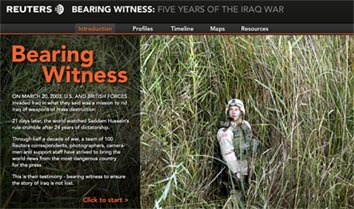Today’s a good day to point at three examples of how you can enhance the value of online news by linking it to additional, meaningful and relevant content.
I’m calling them the Three Spheres of relevance, three different approaches to creating news relevance: locally on a news site by bringing related content to a single destination, by using tagged metadata to enable better linking to relevant material and in the newsgathering process itself (stick with me, this might get into seriously tenuous segue territory).
Thomson Reuters has launched a new version of its semantic tagging tool Open Calais that broadly enhances and builds on its first round of development (hat tip Martin Stabe).
Open Calais has made publicly accessible a piece of internal software used by Thompson Reuters that automatically reads content and creates relationships between different articles, news pieces and reports based on the businesses, places, events, organisations and individuals mentioned in them.
External developers have been encouraged to play with the technology to create an additional level of metadata for their own sites that could offer users a more sophisticated level of additional content around news pieces and blog posts by relying on automatically generated semantic links rather than more rudimentary manual or algorithmically created versions.
The second round of development two has brought WordPress plugins and new modules for Drupal to allow developers to more easily integrate metadata into the applications and third-party tools they are building.
As part of round two, Thomson Reuters has also launched Calais Tagaroo, a WordPress plugin that automatically generates suggested tags for bloggers that want to incorporate additional relevant content to their posts.
This weekend has also seen the launch of New York Times’ Olympics blog, Rings, as a destination where readers can get a plethora of Times content about the Beijing games. The blog is the latest edition to the Times’ Olympics sub-site.
In addition to covering the sporting competition the blog – like the Times’ sub-site – draws in reporting from Times’ sports, foreign and business desks, as well as taking pieces from bureaux in China.
Compare this with the Olympics destination the BBC is running for the games. It could easily draw sporting coverage together with relevant material from the news pages but it has chosen not to make that link and instead leave its users to drift off elsewhere to find out about the other issues surrounding the games. It doesn’t make the most of pulling all the relevant and related material togther in the way the Times does with its blogs and sub-site.
The final example of news organisations working on relevance comes before any of that content is even written.
Guardian editor Alan Rusbridger told the Press Gazette that as part of the newspaper’s adoption of an integrated print and digital news production process reporting staff would abandon the traditional newsdesk structure to instead ape the set-up of Guardian.co.uk reporting staff and be rearranged into subject-specific teams or ‘pods’ to allow closer working between reporters and the ability file for both the web and the print edition as the story demands.

